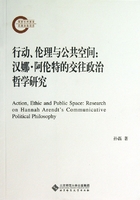
第14章 传统与现代——阿伦特的“事件”史观与政治史观(5)
我们中国人对阿伦特的政治史观并不陌生,因为中国古典史观与古希腊史观在此方面有相似之处。“立德、立言、立不朽”是中国古往今来仁人志士的写照。阿伦特的“事件”史观则更是中国人对待生活、对待历史的态度。“当下即心”是儒家的态度,孔子“思不出其位”就是告诉人不看远处,只看当下。梁漱溟先生由此说,“心在当下即是仁”[45]。现代历史观念主要是通过马克思主义的宣传进入中国。然而中国并没有基督教影响下的末世观念和世俗化的问题。马克思的历史观念进入中国很快与《周礼》《礼记·礼运》中的“大同”思想以及公羊学的“三统三世说”结合起来,构成中国特色的历史哲学。[46]阿伦特的历史哲学对于中国最大的启示在于,通过重新阐释西方古典世界的“事件”史观和政治史观,使我们深入理解西方现代的历史观念的危机所在。在传统与现代拟或“古今之争”的问题上,阿伦特的历史哲学启发我们,在古代与现代、过去与未来之间,没有不可逾越的鸿沟。如何激活当今中国对自身传统的理解,如何重新阐释中国的历史哲学,这些对于中国理解自身的“古今之争”尤其值得进一步深思。
注释
[1]Hannah Arendt:“Understanding and Politics”,Essays in Understanding,1994:324.
[2]参见〔美〕汉娜·阿伦特:《极权主义的起源》,第25页。
[3]参见〔美〕汉娜·阿伦特:《极权主义的起源》,第459~473页。
[4]Hannah Arendt:“Understanding and Politics”,Essays in Understanding,1994:313.
[5]Hannah Arendt:“Understanding and Politics”,Essays in Understanding,1994:316.
[6]Hannah Arendt:Between Past and Future,preface,1961:14.
[7]〔美〕约翰·G.冈内尔:《政治理论史——传统与阐释》,王小山译,杭州,浙江人民出版社,1988,第70页,冈内尔对传统的看法恰恰体现了现代人对传统的误解。
[8]Hannah Arendt:Between Past and Future,preface,1961:5.
[9]Hannah Arendt:“Walter Benjamin”,Men in dark Times,1968:200.
[10]参见〔德〕尼采:《历史的用途与滥用》,陈涛、周辉荣译,上海,上海人民出版社,2005,第5页、11页。
[11]参见〔德〕卡尔·洛维特:《世界历史与救赎历史》,李秋零、田薇译,北京,生活·读书·新知三联书店,2002,第16~17页。
[12]Martin Heidegger:Phnomenologische Interpretation zu Aristoteles,Gesamtausgabe Band 61.Frankfurt am Main,Klostermann,1975:73.
[13]Hannah Arendt:“The Concept of History”,Between Past and Future,1961:52.
[14]参见〔德〕康德:《世界公民观点之下的普遍历史观念》,见《历史理性批判文集》,何兆武译,北京,商务印书馆,1997。
[15]Hannah Arendt:Lectures on Kants political Philosophy,Ed.by Ronald Beiner,Chicago:University of Chicago Press,1982:section3-4.
[16]Hannah Arendt:“Concern with Politics in Recent European Philosophical Thought”,Essays in Understanding,1994:430.
[17]Ibid.,78.
[18]〔美〕汉娜·阿伦特:《极权主义的起源》,第589页。
[19]Hannah Arendt:“The Concept of History”,Between Past and Future,1961:41-43.
[20]Hannah Arendt:“What is Authority”,Between Past and Future,1961:120-123.
[21]Ibid.,121.
[22]Hannah Arendt:“What is Authority”,Between Past and Future,1961:141.
[23]参见〔美〕汉娜·阿伦特:《哲学与政治》,林晖译,见《学术思想评论》(第6辑),贺照田编,长春,吉林人民出版社,2002,第339~347页。
[24]Hannah Arendt:“Projektbeschreibung für die Rockefeller Foundation”,December 1959,Was ist Politik?Hrsg von Ursula Ludz,München:Piper,1993:300.
[25]Hannah Arendt:“Socrates”,The Promise of Politics,Ed.by Jerome Kohn,New York:Schocken,2005:8-11.
[26]Hannah Arendt:The Life of the Mind,1978:86-90.
[27]Hannah Arendt:“Socrates”,The Promise of Politics,2005:28-31.
[28]Hannah Arendt:“What is Authority”,Between Past and Future,1961:108-109.
[29]Hannah Arendt:“Tradition and the modern Age”,Between Past and Future,1961:30-31.
[30]1953年阿伦特在普林斯顿大学开设讲座《卡尔·马克思与西方政治思想的传统》(该讲座的中文已于2007年翻译出版,见《马克思与西方政治思想传统》,孙传钊译,南京,江苏人民出版社,2007)。马克思与西方政治思想传统的关系在阿伦特后来的著作中都有详细讨论,如《人的条件》《传统与现代》以及《论革命》等。
[31]Hannah Arendt:“Walter Benjamin”,Men in dark Times,1968:193.
[32]Ibid.,196-198.
[33]Ibid.,204.
[34]Ibid.,201.
[35]Martin Heidegger:Die Grundprobleme der Phnomenologie,Gesamtausgabe Bd.24,1975:407.
[36]Hannah Arendt:The Life of the Mind,1978:208.阿伦特在这里用来解释思考的无时间性。但她在《过去与未来之间》的序言中说明过去、现在与未来的关系时也使用了卡夫卡的隐喻。
[37]Ibid.,204.
[38]Annette Vowinckel:Geschichtsbegriff und Historisches Denken bei Hannah Arendt,Kln:Bhlau,2001:206-214.
[39]Hannah Arendt:“Tradition and the mordern Age”,Between Past and Future.
[40]Hannah Arendt:“Concern with Politics in Recent European Philosophical Thought”,Essays in Understanding,1994:39.
[41]Ibid.,432.
[42]〔德〕海德格尔:《形而上学导论》,王庆节、熊伟译,北京,商务印书馆,1996,第38页。
[43]有意思的是,海德格尔在为自己投身纳粹所作的辩护中说,这不是某个人的错误,而是存在者处在历史的领域中,这个领域本身是错的。见Annette Vowinckel:Geschichtsbegriff und Historisches Denken bei Hannah Arendt,2001:37。这或许可以有助于理解为什么阿伦特要彻底摒弃现代历史观念。
[44]刘小枫:《〈世界历史与救赎历史〉中译本导言》,北京,生活·读书·新知三联书店,2002,第17页。
[45]梁漱溟:《孔家思想史》,见《梁漱溟全集》(第7卷),济南,山东人民出版社,1995,第885页。
[46]现代思想家对《周礼》的推崇,见熊十力:《论六经》《原儒》;有关公羊学的思想,见廖平《古今学考》;有关大同问题的讨论,见康有为《大同书》等。